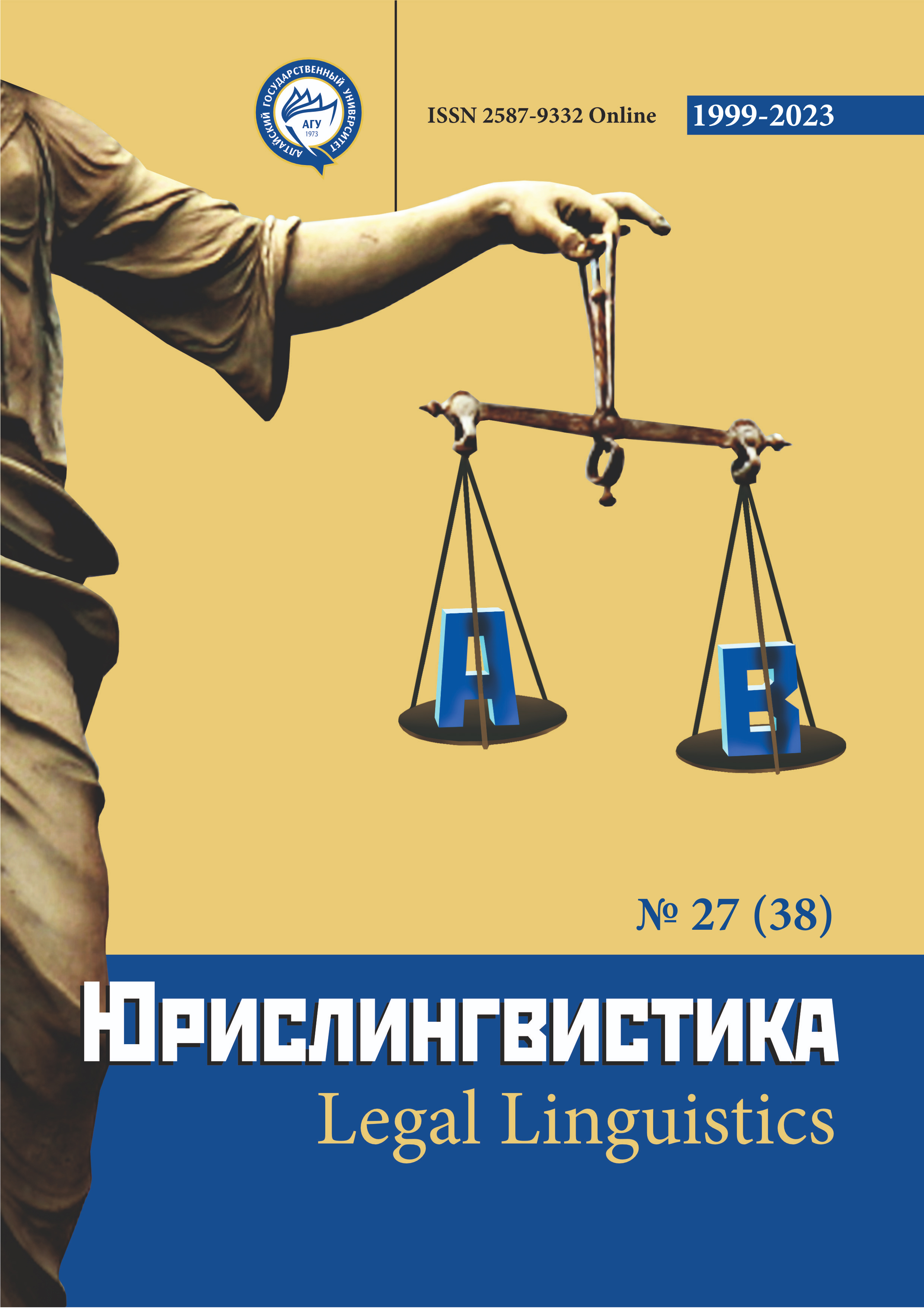Indecent Form of Trade Names
УДК 343.59 ББК 67.408.1
Abstract
The article concentrates on the consideration of the term "indecent form" referring to to linguistic expertise of trade names. There is no interpretation of the concept of "contradiction to public interests, principles of humanity and moral" in the Russian legal system, although in both international and Russian law affecting the protection of intellectual property (and trade names in particular), this concept is enshrined and works as one of the grounds for refusal of state registration of a trademark/service mark. The article proposes to include the notion of contradiction to public interests, principles of humanity and morality into the scope of concept of "indecent form" recognized in legal linguistic practice when solving practical issues of intellectual property expertise (in particular, the linguistic part of such expertise).
Downloads
Metrics
References
Галяшина Е. И. Судебная лингвистическая экспертиза: учебник. М., 2021.
Кузнецов В. О. К вопросу об экспертных понятиях в судебной лингвистической экспертизе / Теория и практика судебной экспертизы. - 2020. – Т. 15, № 1. - С. 29-41. https://doi.org/10.30764/1819-2785-2020-1-29-41
Марков В. И. «…или иной противоречащей нормам морали и нравственности форме». К вопросу об эффективности лингвистической экспертизы / Ученые записки Новгородского государственного университета. – 2021. - №6. – С. 680-683. https://doi.org/10.34680/2411-7951.2021.6(39).680-683
Новичихина М. Е. Коммерческая номинация: теория и практика. Воронеж, 2018.
Судебная лингвистическая экспертиза по делам об оскорблении / Изотова Т. М., Кузнецов В. О., Плотникова А. М. М., 2016.
Парижская конвенция по охране промышленной собственности от 20 марта 1883 года, пересмотренная в Брюсселе 14 декабря 1900 г., в Вашингтоне 2 июня 1911 г., в Гааге 6 ноября 1925 г., в Лондоне 2 июня 1934 г., в Лиссабоне 31 октября 1958 г. и в Стокгольме 14 июля 1967 г. и измененная 2 октября 1979 г. URL: https://www.consultant.ru/document/cons_doc_LAW_5111/.
Россинская Е. Р., Галяшина Е. И. Настольная книга судьи. Судебная экспертиза. М., 2014.
Решение Арбитражного суда Волгоградской области (АС Волгоградской области) от 21 марта 2022 г. по делу № А12-35564/2021. URL: https://sudact.ru/arbitral/doc/i2N01hDdd2Wb/.
Решение Суда по интеллектуальным правам от 15 февраля 2022 г. по делу N СИП-1093/2021. Суд признал недействительным решение Роспатента, принятое по результатам рассмотрения возражения на решение об отказе в государственной регистрации товарного знака, и обязал ответчика предоставить правовую охрану обозначению, поскольку из решения административного органа не усматривается какое-либо обоснование вывода о том, что регистрация данного обозначения в качестве товарного знака может создать препятствия для добросовестной деятельности других хозяйствующих субъектов. URL: http://ipcmagazine.ru/news/6201-news4754.
Руководство-2016 – Руководство по экспертизе товарных знаков в Федеральной службе по интеллектуальной собственности. М., 2016.
Руководство-2020 – Руководство по осуществлению административных процедур и действий в рамках предоставления государственной услуги по государственной регистрации товарного знака, знака обслуживания, коллективного знака и выдаче свидетельств на товарный знак, знак обслуживания, коллективный знак, их дубликатов. М., 2020.
Copyright (c) 2023 Анастасия Акинина

This work is licensed under a Creative Commons Attribution 4.0 International License.
The authors, which are published in this journal, agree to the following conditions:
1. Authors retain the copyright to the work and transfer to the journal the right of the first publication along with the work, at the same time licensing it under the terms of the Creative Commons Attribution License, which allows others to distribute this work with the obligatory indication of the authorship of this work and a link to the original publication in this journal .
2. The authors retain the right to enter into separate, additional contractual agreements for the non-exclusive distribution of the version of the work published by this journal (for example, to place it in the university depository or to publish it in a book), with reference to the original publication in this journal.
3. Authors are allowed to post their work on the Internet (for example, in a university repository or on their personal website) before and during the review process of this journal, as this may lead to a productive discussion, as well as more links to this published work (See The Effect of Open Access).











